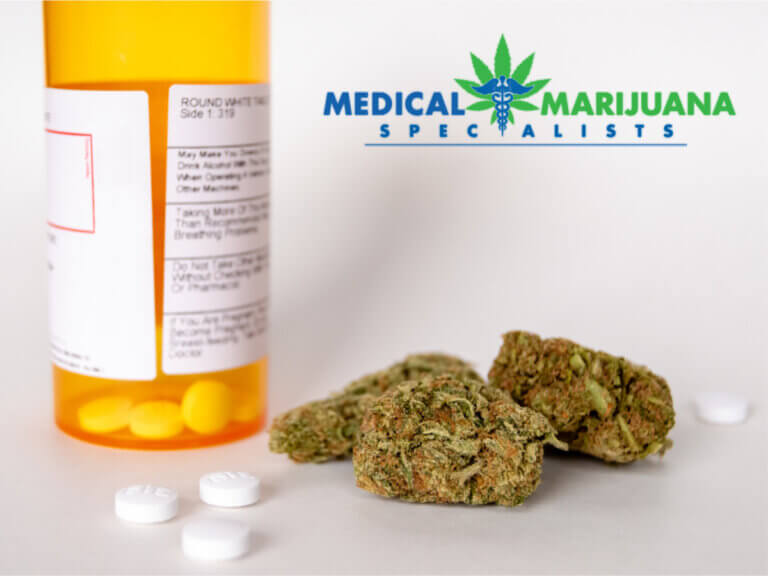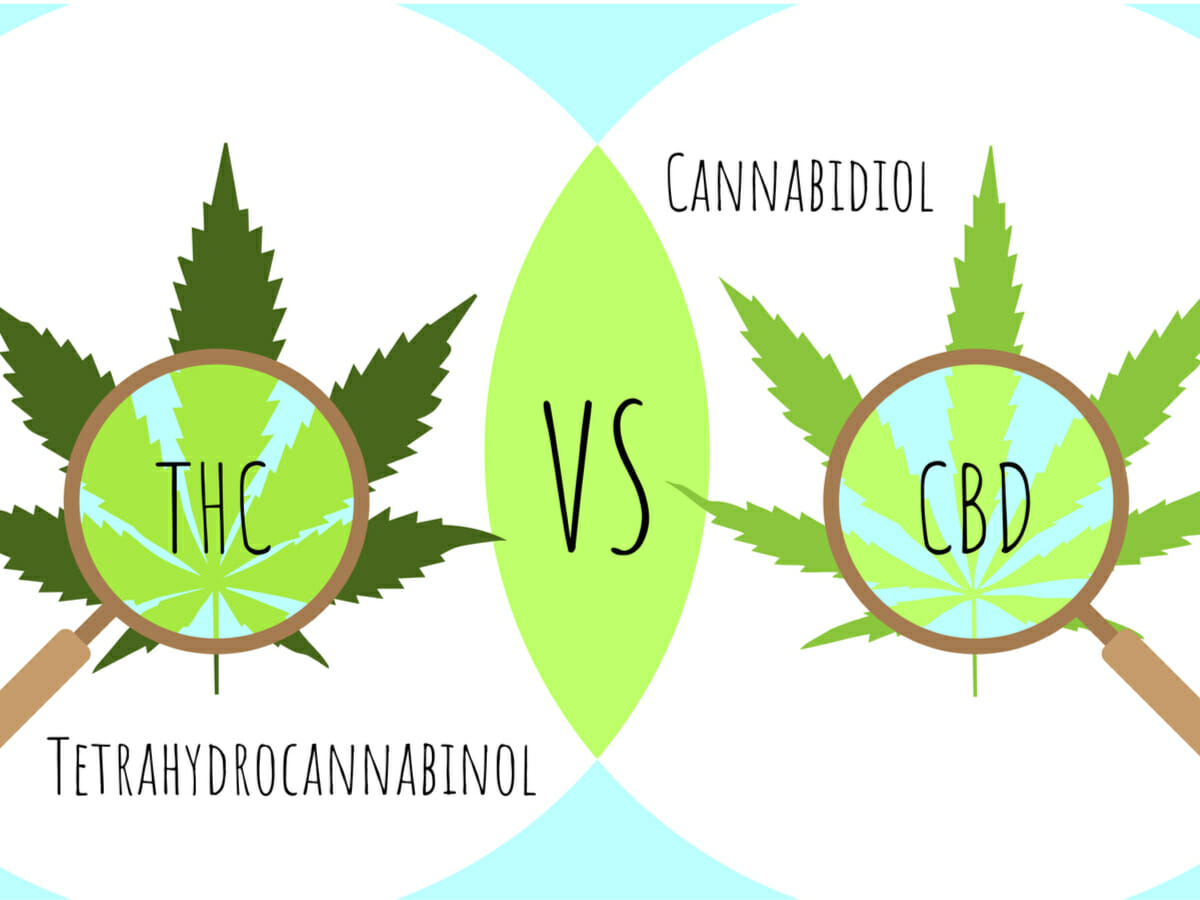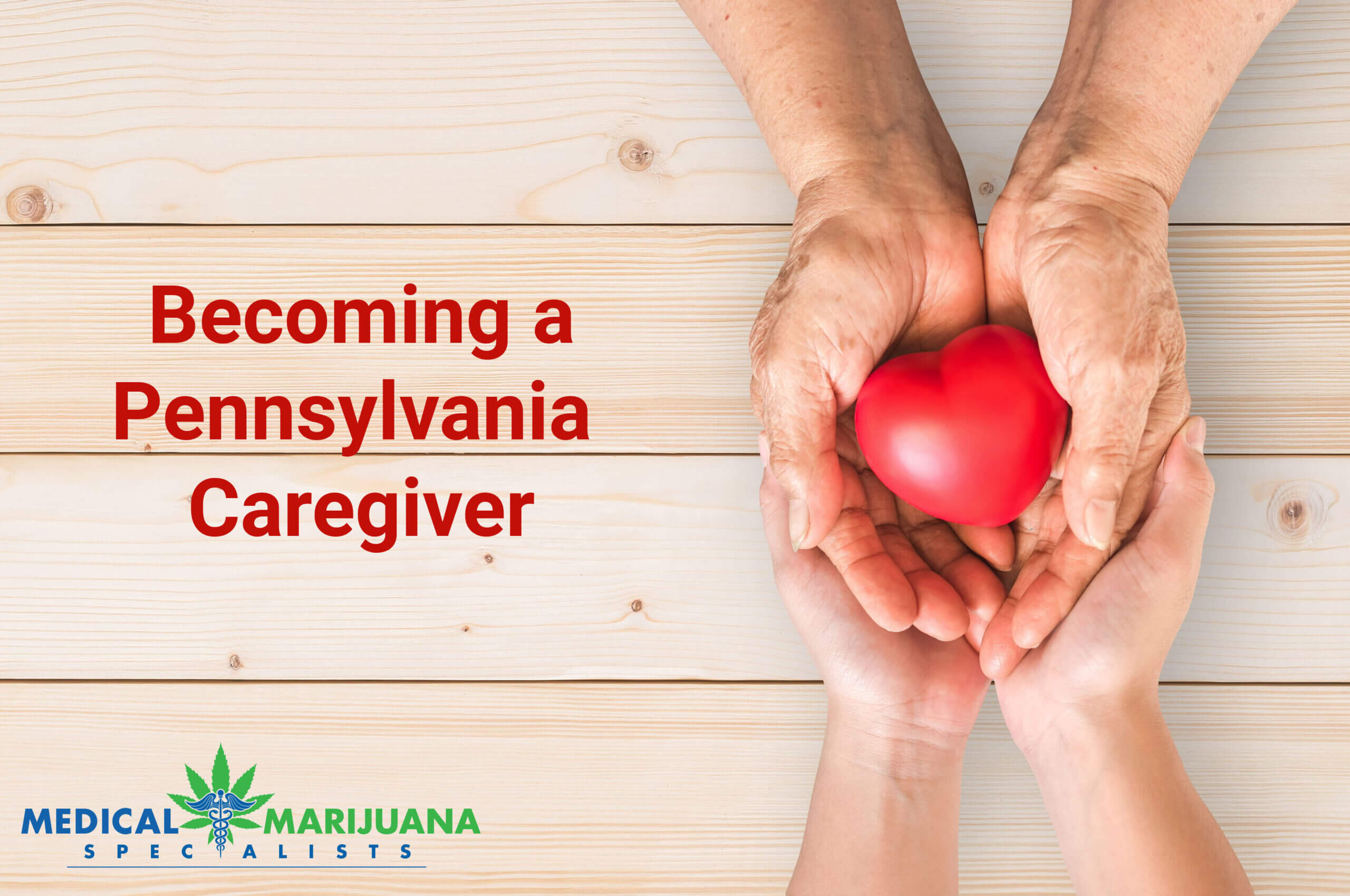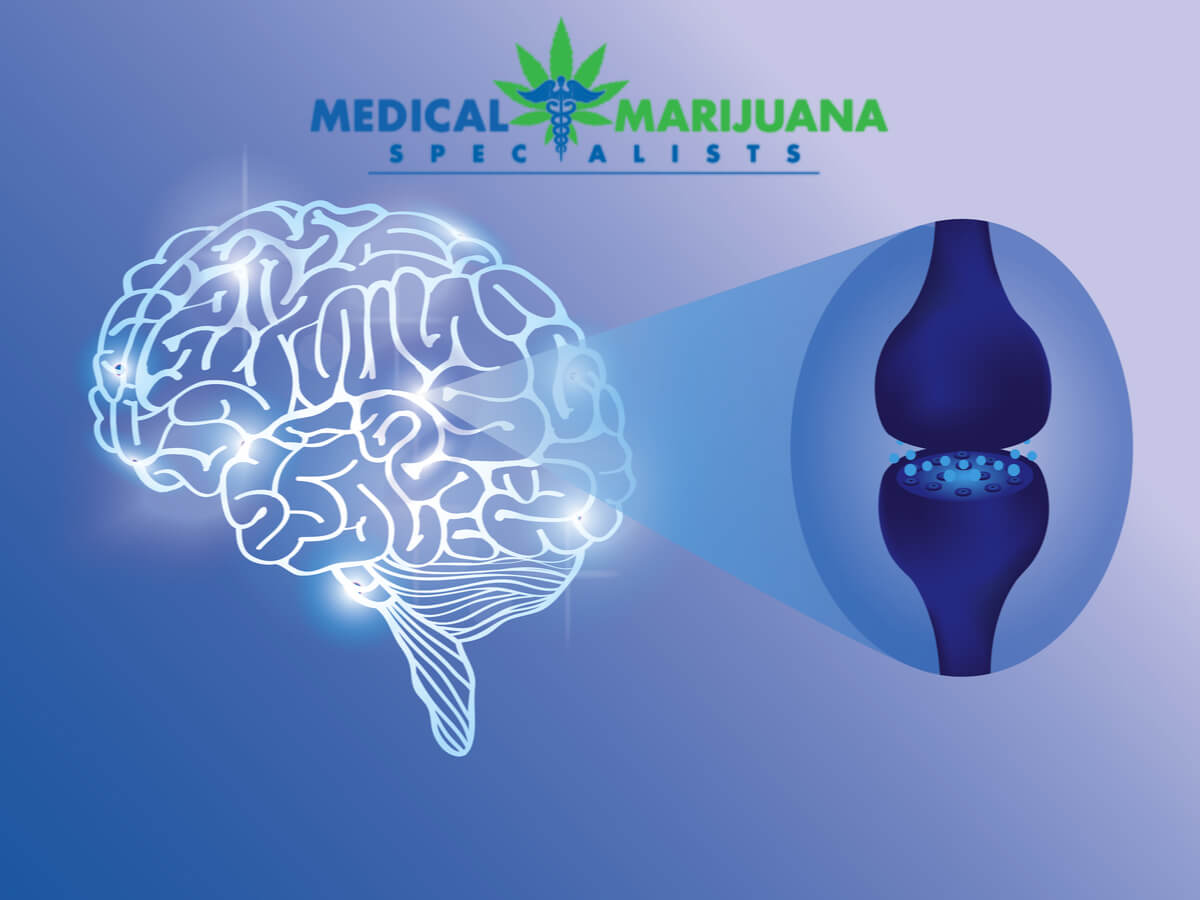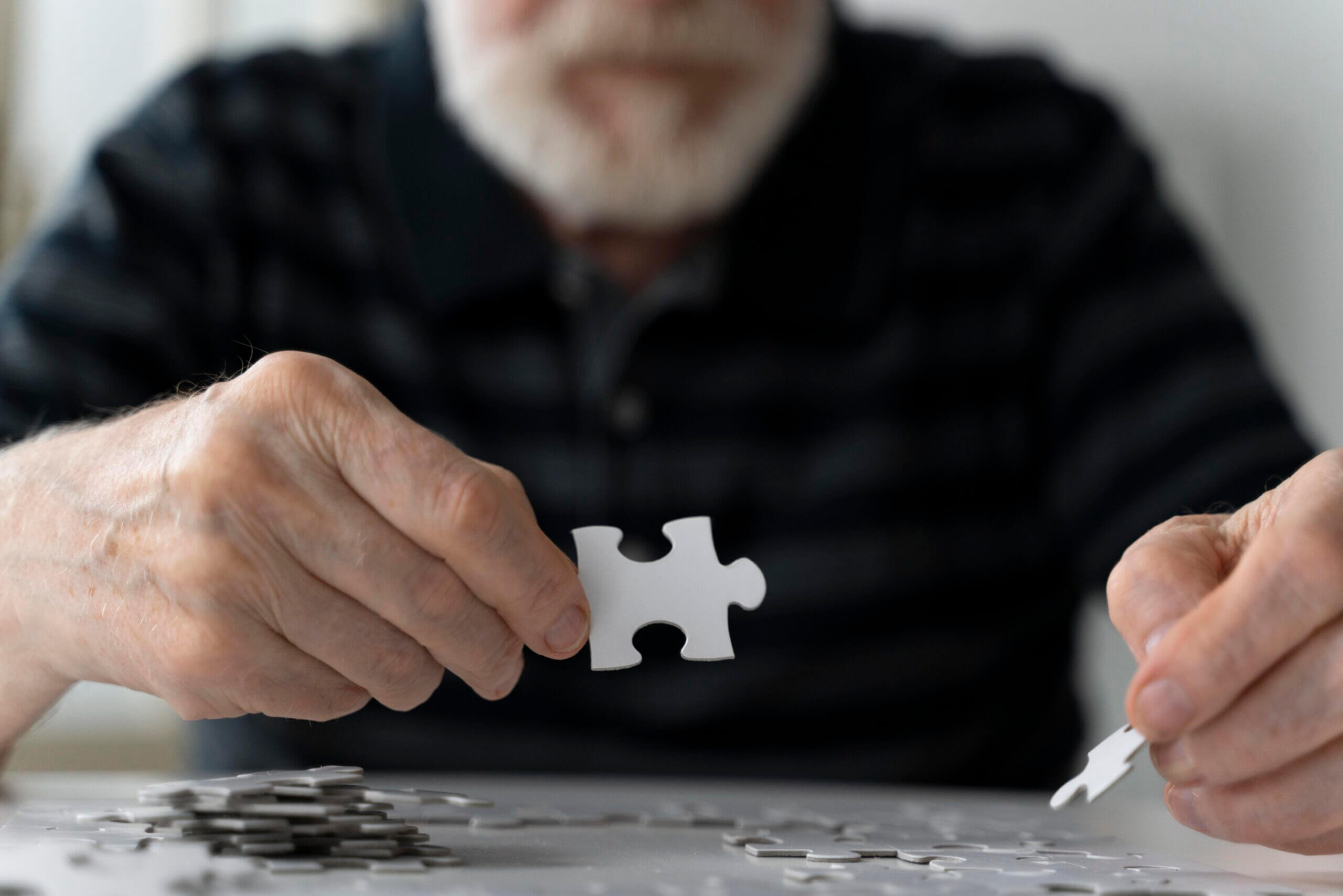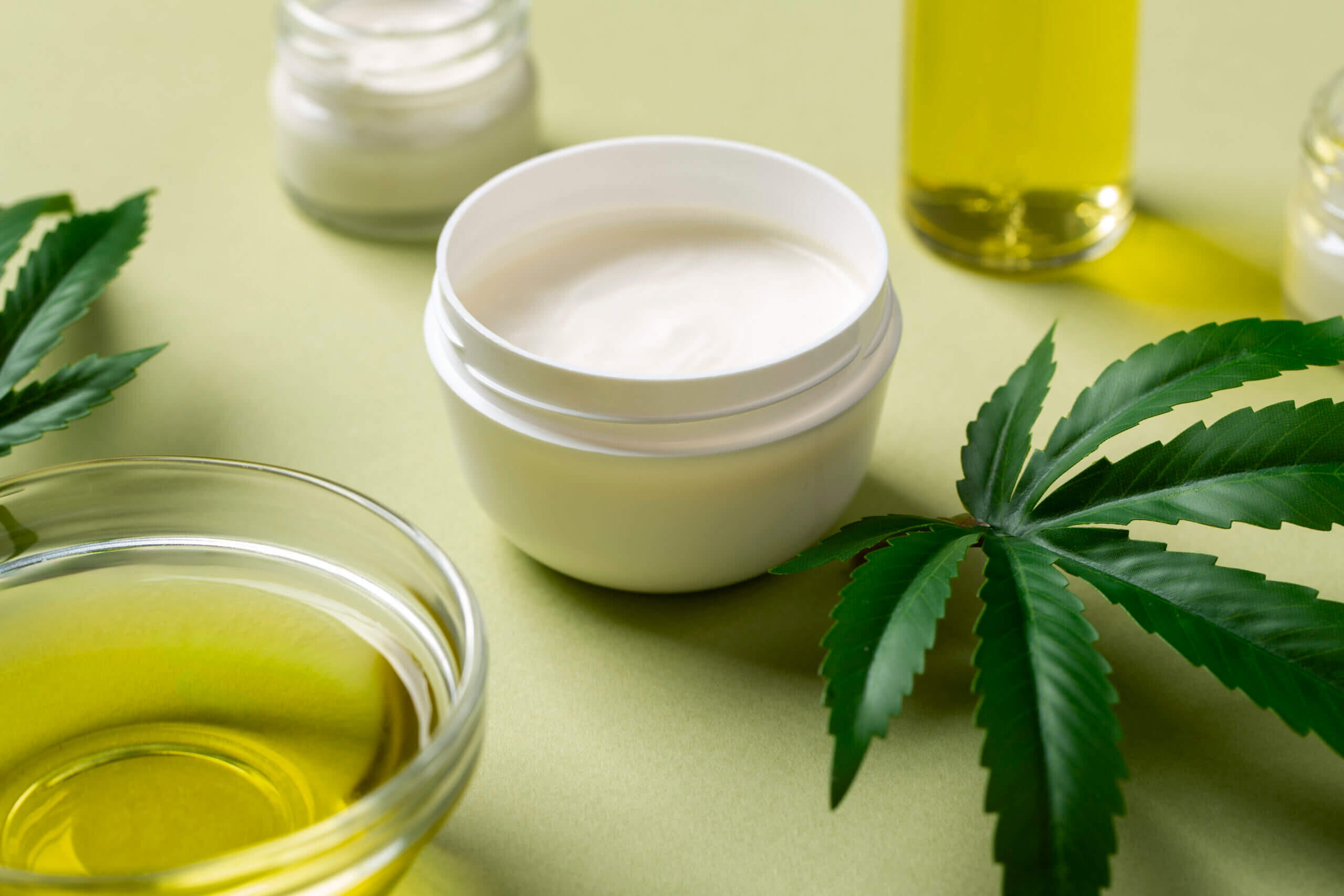Is there a better choice between marijuana and opioid addiction?
Thankfully, there is. Taking opioids to relieve and manage pain is harmless at first, but they are effortless to become addicted. Most don’t realize they have even become dependent until it is too late. Marijuana on the other hand is generally non-addictive and can be used as a way to ween off opioids.
With an estimated 26-36 million people worldwide suffering from opioid addiction, you are not alone. We know how difficult it is to overcome, and this article is here to help show you another way.
Not only does marijuana help relieve pain and anxiety, but it helps with withdrawal symptoms. With more studies on the benefits of marijuana, there has never been a better time to get your medical marijuana card for opioid addiction.
What Are Opioids?
Opioids are a class of drugs that are commonly referred to as “painkillers.” They include prescription drugs, such as oxycodone, hydrocodone, codeine, morphine, and fentanyl. Opioids also include the illegal drug heroin. They are all extraordinarily addictive and harmful to your body if abused.
Opioids are used to relieve chronic pain. Once the drugs enter your body, they attach to opioid receptors in your brain that mute the perception of pain. They can cause a “rush” or a sense of euphoria.
Why Are They Dangerous?
Opioids are highly addictive, and the more you take them, the more accustomed your body will become to the drugs. Opioids cause you to increase the dosage so that you can experience the same relief. The higher the dosage, the more opioids cause your heart and breathing to slow down, which could lead to death.
Since you have to keep increasing the dosage to get the same amount of relief, it is easy to become addicted. Often, you don’t realize you’re becoming addicted or already addicted until it is too late.
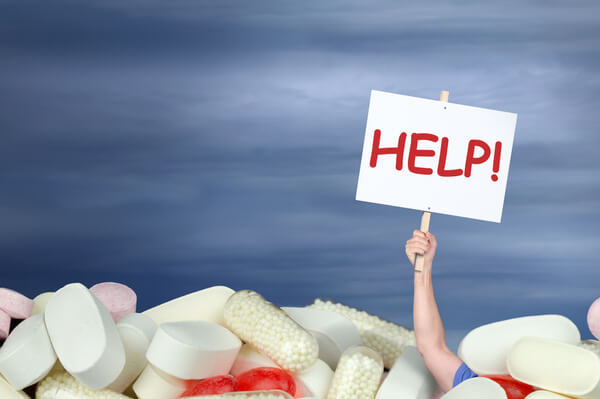
Marijuana is an excellent alternative to addictive and dangerous opioids. It is common to wonder, “Aren’t I just trading one drug for another?” However, there are many health benefits to using marijuana to relieve the same symptoms as opioids, and it is a safer option for those who wish to overcome opioid addiction.
Signs and Symptoms of Opioid Addiction
Our brains are wired to seek out rewards, so when we find something that alleviates the pain, it is easy to become addicted. Addiction occurs when you cannot stop taking opioids, but experience withdrawal symptoms, such as cravings or sweating, if you are forced to quit. Some signs of addiction include:
- Inability to control your usage of opioids
- Drowsiness
- Cravings
- Changes in sleep patterns
- Weight loss
- Isolation from family and friends
- Stealing from family and friends to pay for more drugs
It is important to remember that opioid addiction is a disease. Once addicted, our brains can only think about how to get more to feel better again. Marijuana has been found to lessen the cravings and allow those addicted to taper off slowly, reducing the withdrawal symptoms.
Is It Possible to Be Addicted to Marijuana?
Marijuana is non-addicting, but it also depends on your genetics, frequency of use, and mental health. People who use marijuana occasionally do not typically become addicted, but it is still possible.
Marijuana consists of delta-9-tetrahydrocannabinol (THC) and cannabidiol (CBD). The higher the potency of THC, the more addicting it can become. THC levels are typically between 54% and 69% in extracted concentrates such as cartridges and 18% and 30% in the dry leaf.
When monitored, medical marijuana is a safer alternative and can be used as an “exit drug.” It is important to follow the directions of the marijuana strain you’re given. Professionals have been trained and will help choose the right strain and dosage based on your needs.
Does Legal Marijuana Reduce Opioid Use?
It is no coincidence that states with legal marijuana have experienced a decline in opioid abuse rates. Offering safe alternatives and places to purchase marijuana have allowed societies to normalize the feeling of having recreational drugs in a public setting. People are feeling less pressure to use opioids with legal alternatives at arm’s reach.
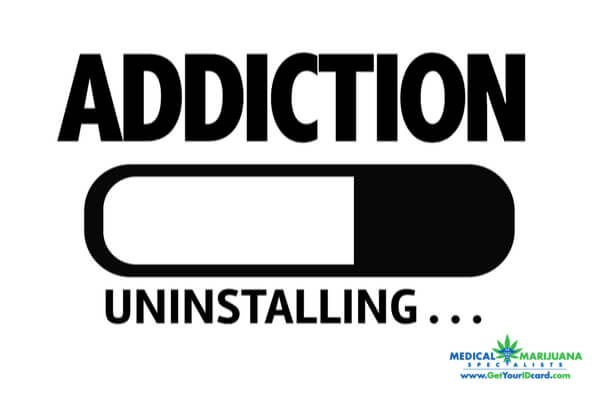
Medical marijuana helps reduce chronic pain and anxiety. The professional staff at dispensaries will be able to help pick the best strain for managing these symptoms. They are trained and equipped to offer a wide range of products depending on the unique needs of the customer base.
At a care center in Massachusetts, 80 people went through a one-month program introducing medical marijuana and reducing opioid use. More than three-quarters of patients used only marijuana and stopped using harder drugs. In Pennsylvania, opioid abuse is a common factor in signing up for the medical program.
While this is somewhat a state issue, the overall benefits to recreational marijuana use have far outweighed the risk. Be sure to consult your state’s recreational marijuana laws as you take the next steps.
Can Marijuana Help With Chronic Pain?
We know how hard it is to manage pain that can feel unbearable most days. It can be difficult to focus on anything besides the pain, and if there is any chance to end the pain for a few moments, you’ll take it.
Medical marijuana is a natural alternative to managing chronic pain. CBD has been shown to help inflammatory and neuropathic pain, two of the most difficult types of pain to treat. Medicinal marijuana has been shown to help relieve pain in several different illnesses, which are shown below.
For more information on marijuana and chronic pain, or how to get a medical marijuana card for chronic pain, visit here.
Can Marijuana Help With Anxiety?
Marijuana has been shown to reduce anxiety symptoms in many different anxiety disorders, including:
- Post-traumatic stress disorder (PTSD)
- Generalized anxiety disorder
- Obsessive-compulsive disorder
- Social Anxiety disorder
Looking for local dispensaries? We have a list here for your convenience.
You will want to talk to the professionals and make sure you are getting the correct strain for helping with anxiety, as the Indica strain is more likely to cause a calming effect and the Sativa strain causes more energy.
If you would like to see more about marijuana and anxiety, or get a medical marijuana certification for anxiety, visit here.
Let’s take a look at some of the health benefits that medicinal marijuana has to offer.
Are There Any Health Benefits From Marijuana?
Medical marijuana has many health benefits for you to consider.
- Pain management
- Reduced inflammation
- Help treat mental disorders
- Can help battle insomnia
- Effective anti-depressant
- Fights cancer
- Reduces migraines
- Feeling more relaxed
- Feeling of euphoria
- Treat PTSD
- Pain Management for Multiple Sclerosis (MS)
- Prevent Alzheimer’s
While this list is not “all-inclusive,” there are new benefits to medical marijuana being discovered as recreational use legislation is making its way through the state governments. We are discovering new benefits daily!
Now let’s look at the potential health risks so you can make the best decision for you or your loved one.
What Are the Health Risks of Marijuana?
- Dry mouth – drinking more water helps alleviate this
- Depressant effects
- Red eyes
- Slower reaction time
- Increased heart rate
- Increase appetite (if unwanted)
- Trouble remembering
- Lazy
- Slurred Speech
- Dizziness
These health risks, compared to some over-the-counter medications, are mild. With any medication, moderation and understanding your own body are key to managing your health.
Is There a Better Choice Between Marijuana and Opioid Addiction?
In short, yes. If you are looking for a safer way to manage pain or anxiety, marijuana is the best alternative for beating an opioid addiction. Marijuana has proven to offer long-lasting care over the short-term effects that opioids can offer.
Marijuana also helps to correct sleeping patterns. If you are battling insomnia, Indica strains will help calm you down, while Sativa strains will keep you energized during the day. The positive effects that both strains provide can lead to overall sleep improvement and efficiency throughout the day.
By providing the same “rush” of euphoria as opioids, marijuana can provide similar feelings and relieve any severe pain while remaining a safer option and more beneficial to your body.
Both the Indica and Sativa strains provide their euphoric effects while still allowing the user to benefit from the positive health effects that marijuana has to offer.
Can CBD Help With Drug Addictions?
Cannabidiol (CBD) is a chemical found in medical marijuana and derives from the hemp plant. CBD helps in lowering opioid use, as well as lowering anxiety. These are some of the high-level causes of first-use in opioids.
CBD studies have shown that it lowers heroin cravings, making it a safer and effective treatment in overcoming opioid addiction. CBD is also proven to reduce stress and anxiety among users, as well as relieving pain. This leads many users to focus more on a treatment-based recreational use pattern rather than sourcing opioids through alternative means.
CBD also offers a legal remedy to the same issues that opioids are used to combat. The ability to consult a healthcare professional and find the proper course of therapy legally is helpful.
What Is the Best Alternative to Opioid Medication?
If you are still looking for opioid-free medications to help manage pain, here are some alternatives.
- Acetaminophen (found in Tylenol)
- Ibuprofen
- Aspirin
- Advil
- Motrin
- Aleve
While these medications do not have pain-blocking receptors similar to opioids, they are much safer and non-addicting.
It is worth noting that the side effects of marijuana use compared to the warning labels on over-the-counter medications are drastically different. While marijuana users can have mild symptoms, some medications have serious dangers that come with their regular or prolonged use.
Will Marijuana Help End the War on Drugs?
While there is still a long way to go, marijuana will help end the War on Drugs in this country. More and more states are decriminalizing the use of marijuana and making the use of medicinal marijuana easily accessible to all. With the rise of marijuana entering mainstream society, more studies have been done to show the benefits of marijuana against many ailments and diseases.
More and more doctors are learning how marijuana can aid people with severe chronic pain, anxiety, mental health disorders, and physical diseases such as MS and arthritis.
Studies show that marijuana is an effective form in beating opioid addiction. The opioid crisis that exists is dangerous and harmful to our loved ones. It is a challenging addiction to overcome, and marijuana can give you the hope and means to recover.
The War on Drugs has done so much to pave the way for the safe use of recreational drugs in America. Shifting the narrative to responsible and medical use provides us the ability to offer real assistance to people just like you!
Fight Opioid Addiction With Marijuana Treatment
In the past, access has been a problem for many seeking the therapeutic remedies that marijuana has to offer. We want to help you! We can help you get your marijuana certification quickly so you can get the help you need.
We provide a one-stop-shop that gets you certified and answers all of those questions that keep you from taking the next step. Please reach out to us so that we can begin your health journey!
Our team of doctors and professional staff is here to give you the care and respect you deserve on your journey to healing. We will have your medical marijuana card certified in one day because we know how much your health means to you and your family. Choosing between marijuana and opioid addiction is possible and attainable! Let us help you take the first step on your journey to a better and healthier lifestyle.

